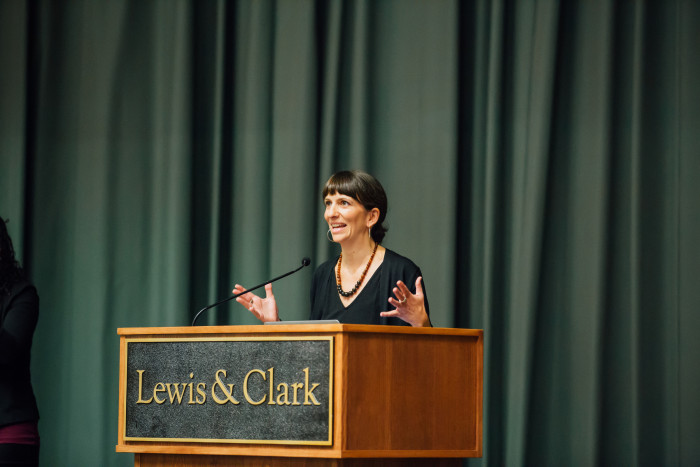Hispanic Studies Professor Recognized for Teaching Excellence
Assistant Professor of Hispanic Studies Magalí Rabasa has received the Arnold L. and Lois S. Graves Award. The grant will allow Rabasa to pursue research on feminist economies of knowledge in the Americas over a two-year period. This summer, she will travel to New York to conduct research in the Interference Archive, a space that catalogues the cultural production of social movements.
by Yancee Gordon BA ’21

Assistant Professor of Hispanic Studies Magalí Rabasa is the latest recipient of the Arnold L. and Lois S. Graves Award. This prestigious award, administered biennially by Pomona College and the American Council of Learned Societies, is given to younger professors who demonstrate excellence of teaching in the humanities in order to fund new research opportunities.
“Magalí was a perfect candidate to nominate for this award because she is both an inspirational teacher and a productive scholar in the humanistic tradition,” said Dean of the College of Arts and Sciences Bruce Suttmeier. “She equips her students to find meaning in the world around them, and helps them learn skills for interpreting life.”
Since she joined the Lewis & Clark faculty in 2016, Rabasa has brought her expertise of Latinx and Latin American cultural studies to a variety of departments, including Hispanic studies, Latin American studies, ethnic studies, and gender studies. Her new research exploring feminist economies of knowledge in the Americas reflects this interdisciplinary nature.
“My research over the past decade has focused on the ways that the theories and ideas developed by activist communities travel around the world, gaining new meaning as they move in and out of different spaces,” said Rabasa. “This project extends my longstanding interest in transnational networks of social movements while focusing on the specific ways that feminism is being reimagined and practiced in the Americas today.”
Her $10,000 grant will cover two years of research. In the summer of 2020, Rabasa will travel to New York to conduct research in the Interference Archive, a space that catalogues the cultural production of social movements. The following summer will be spent in Mexico City collecting new materials including local, site-specific media and other media found in activist spaces, alternative archives, and libraries with the help of an undergraduate research assistant.
“The idea of feminist economies of knowledge refers to networks of knowledge production and reception grounded in ethics of collaboration, open inquiry, nonhierarchical organization, solidarity, and social justice,” continued Rabasa. “By turning our attention to marginal, or even underground, spaces where people are thinking and working together, we can learn a lot about questions of power as well as new possibilities for making knowledge and media in the 21st century.”
Rabasa is the ninth recipient of this award from Lewis & Clark, following Bryan Sebok (2018), Kristin Fujie (2014), Rachel Cole (2012), Joel Martinez (2010), Karen Gross (2008), David Campion (2006), Rebecca Copenhaver (2004), and Aaron Beck (2000). She hopes her research will culminate in the curation of an exhibit at Watzek Library of new feminist media in Latin America.
“I’m especially excited to have the chance to gather new materials to incorporate in my classes, including materials that students might not otherwise have access to, like underground publications, photographs of street art, independently produced music, and other alternative media.”
More Newsroom Stories
Public Relations is located in McAfee on the Undergraduate Campus.
MSC: 19
email public@lclark.edu
voice 503-768-7970
Public Relations
Lewis & Clark
615 S. Palatine Hill Road MSC 19
Portland OR 97219

